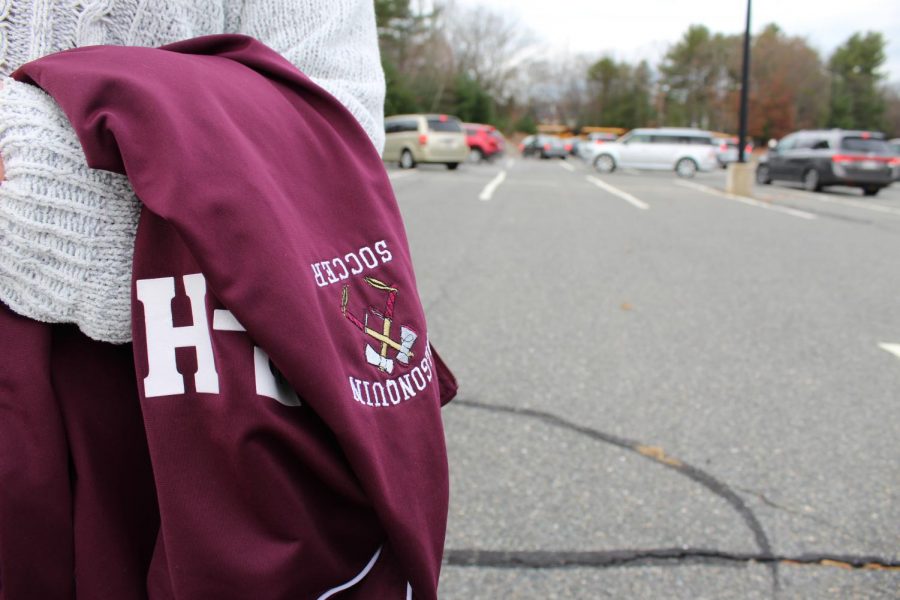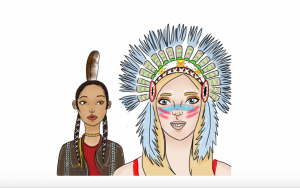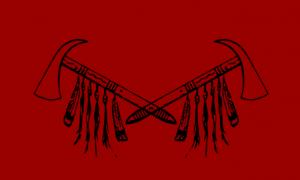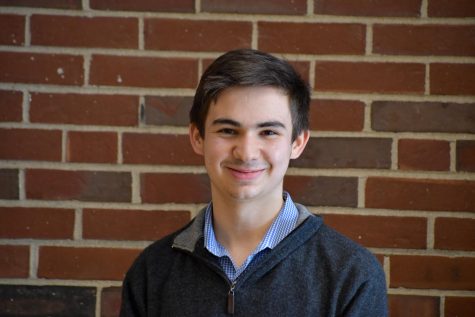Bevan to lead study group on Tomahawk mascot, cultural appropriation
Senior Megan Harrington carries her soccer jacket displaying the tomahawk mascot, the subject of a petition calling for change written by “Students for Justice”.
November 25, 2020
In response to social movements and a petition which gathered about 3,500 signatures, Principal Sean Bevan will be leading a study group to explore changing Algonquin’s mascot.
The current mascot—the Tomahawk, often referred to as the T-Hawk—is a Native American ax similar to a hatchet, and it has been a topic of debate at Algonquin for years.
The petition, written by Algonquin alumni under the name “Students for Justice,” called for the district, superintendent and ARHS principal to change the name and mascot for Algonquin. Many of those who signed it are current and former members of the Algonquin community.
Bevan sent an email on Nov. 18 to students seeking applicants for a “short-term study group to review the mascot,” hoping the group can work together to determine if the Algonquin mascot needs to be changed.
What is the main goal of the study group?
“We’re responding to what is a very strong interest, as demonstrated by a petition that we saw online and in meetings with the petitioners, to change the mascot. The petition itself had lots of other features to it, namely a desire to change the name of the school and also to address the chant that happens at some of our athletic events. At this point, we’ve worked with the petitioners to identify the mascot as being the area they’re most interested in seeing change happen. So this group will examine our current mascot… and what the benefits of keeping the mascot are versus what the costs and benefits would be to changing the mascot.”
How many people are you looking for?
“I’ll be looking for a few students and then some adults who represent different stakeholder groups… We’re even looking at perhaps having someone from the Native American community. It’ll probably be 10 or 12 [people]. I got a strong response in my email to students asking for volunteers… The challenge I faced is I don’t think any one student will perfectly represent the interests of every kid because students’ opinions vary widely, so I’m going to be identifying some other avenues for getting broader student perspectives on that.”
Is there any focus on changing the school name right now, or is this strictly focused on the mascot?
“We are not examining changing the name of the school.”
In addition to the petition, what is driving you to consider these changes?
“Well, the petition alone was enough to prompt my response and really obligated my response… My first responsibility is to meet the needs of our students and our current families. We also certainly have an interest in keeping our alumni happy and keeping them informed about their school.”
What will the first steps be for the group?
“I’ll be holding a meeting with that group. In that meeting, what I’d like to do is to share with them an overview of the history of our school.
This is a strategy I’m considering, but establishing for them a baseline understanding of where our school name emerged from, where the mascot came from and maybe even some information about other initiatives that were undertaken to change either this school [name] or the mascot.
I think it will be valuable for everybody in the study group to be working from an identical set of facts because otherwise people [will] arrive with their own conclusions and their own information… Then I think we will be looking at what our timeline will be and what our outcomes will be. I think the study group will probably make a recommendation to the school committee at some point in the next calendar year about what our school community’s response will be to the interest in changing the mascot.”
What is your personal opinion on the matter?
“I certainly believe strongly in the value of tradition. But I also feel that it’s important that our traditions don’t come at the expense of others. And I think that’s why this is a tricky situation because we have this symbol that generations of Algonquin students have associated with fond memories, [but] we also have a group of people who are telling us that image causes harm. So my own personal opinion is that I need to examine it more. I need to read about the research about the kind of harm that mascots like ours might cause to a community before I make up my mind fully.”
Will you be working with the District’s Coalition for Equity?
“The Study Group will include members from the Coalition for Equity.”
“[The district] has several initiatives that are in the realm of culturally appropriate education and culturally responsive instruction. And I think this falls under that larger umbrella… No matter what the outcome here is, [I think it is important] that kids are educated on where our name came from, how we have our mascot currently and we don’t have any of that [in our current curriculum]… I imagine [students] haven’t had a lot of education on why our school’s name is what it is, except for a vague awareness that it’s a Native American tribe. So I think building in some education about the history of our school, its name and our mascot, will be a [positive] outcome any way you cut it.”
Editors Note: The author of this piece is a member of the Study Group for Mascot Review, but was not a member at the time of writing.












